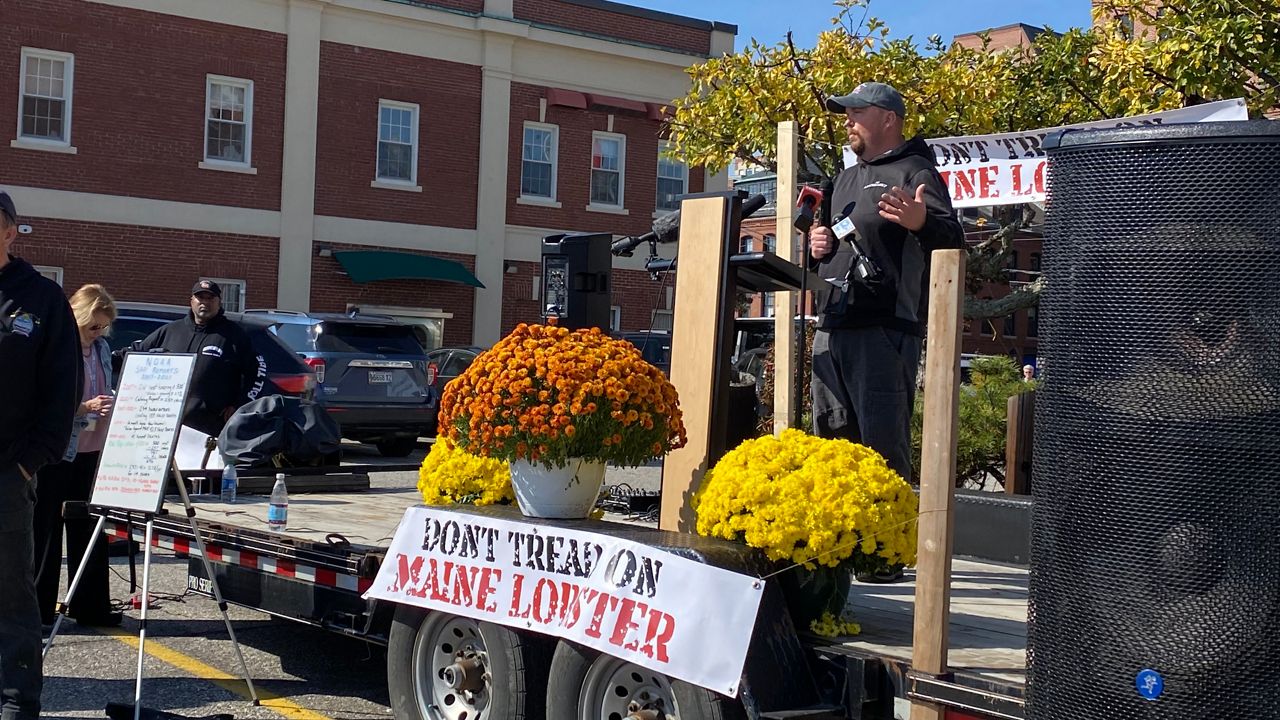Stonington lobsterman Dwight Staples’ 37-foot lobster boat provides the essentials for 10 people.
His wife, his three children and his stern man’s wife and their three children all rely on Staples to put food on the table and pay the bills. But he fears new federal regulations will put an end to his livelihood and the paychecks of thousands of other Mainers who rely on lobster to make a living.
“This year has been different for me and maybe it has for you as well,” he told a large crowd in Portland Wednesday. “This year it seems so much I have to get up and fight to go to work. With all these restrictions, regulations coming down the pike, it seems as though we’ve had to get up and fight each and every day.”
Staples addressed hundreds at a rally organized by the Maine Lobstering Union to oppose federal regulations on lobster gear and restrictions on fishing areas designed to protect endangered right whales.
Union Director Virginia Olsen and others who are fighting the new federal regulations called on Attorney General Aaron Frey Wednesday to file suit against the federal government, rather than serve as an intervenor.
“We need the state to step up and say what’s happening is wrong,” Olsen said.
In response, Frey released a statement outlining efforts the state has taken since at least 2014 to push back on federal regulations.
He said the state is making the same arguments as an intervenor as it would as a plaintiff and that filing another lawsuit against the National Oceanic and Atmospheric Administration “would be legally insignificant.”
“My office has spent countless hours over years defending and protecting Maine’s lobster industry against unsubstantiated NOAA rulemaking,” Frey said. “Any suggestion to the contrary ignores the years of legal work that has gone into this defense.”
The lobstering union’s call for an additional state response comes at a time when the lobster industry is feeling pressure from all sides, from changes to their gear and restrictions on where they can fish, to a recent red list designation from the Monterey Bay Aquarium Seafood Watch.
In addition, the industry is involved in two lawsuits to challenge federal rules designed to protect right whales.
Lobstermen and others who spoke Wednesday said if the federal rules go fully into effect, it will jeopardize one of Maine’s signature industries. Maine has about 4,750 commercially licensed lobstermen and 1,085 student license holders, according to the Maine Lobstermen’s Association.
The fleet supports 12,000 “jobs on the water” and an additional 5,500 shoreside jobs through its supply chain. Its value to the Maine economy is estimated to be about $1 billion a year.
Opposition to the right whale rules have served as a rallying cry for Maine politicians of all stripes, with Republicans, Democrats, and independents united.
All three candidates running for Maine’s 2nd Congressional District attended the rally, as did former Gov. Paul LePage, a Republican, and 1st District Republican candidate Ed Thelander.
On Tuesday, the lobstermen’s association announced that it hired former U.S. Solicitor General Paul Clement as part of its lawsuit to challenge the right whale rules put in place by the National Marine Fisheries Service.
Those rules include closing certain areas to lobster fishing for part of the year, requiring fishermen to use vertical lines with weak points to reduce the possibility of whale entanglement and requiring lines to be marked so the federal government can better identify who owns the line.
The rules, announced in August 2021, are in response to what NOAA described as an “unusual mortality event” in which 34 right whales have died since 2017.
There fewer than 350 right whales left, according to NOAA. They were hunted to the brink of extinction by the early 1890s, but have never fully recovered. Fishing gear entanglements and vessel strikes are the leading cause of death of the whales today, according to NOAA.
But Maine lobstermen say there has never been a documented event in which a right whale died because of an entanglement with their gear. The last entanglement involving Maine lobster gear was reported in 2004.
NOAA estimates that 62 Maine-based fishing vessels would be impacted by the closure of about 967-square miles of fishing area from October through January.
Also Tuesday, Gov. Janet Mills announced that she is dedicating $100,000 from her contingency fund to the lobstermen’s association legal defense fund. She also directed the Maine Department of Marine Resources to file a motion to expedite the appeal of the national fisheries service rules.
And last week, hundreds of lobstermen and their supports told federal regulators at a public hearing that their industry cannot survive the right whale restrictions.
On top of that, lobstermen and Maine politicians have decried the Seafood Watch designation, which advises consumers against eating Maine lobster, expressing “a high level of concern with the environmental impacts of these fisheries.”
In response, U.S. Rep. Jared Golden (D-2nd District) sponsored legislation to withhold federal funding from the aquarium and Sen. Angus King, an independent, introduced similar legislation in the Senate.
The bills are supported by Sen. Susan Collins, a Republican, and U.S. Rep. Chellie Pingree, a Democrat.



